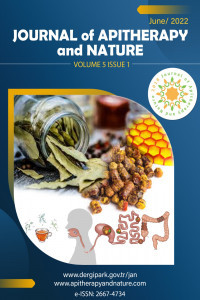Effects of Propolis on the Quorum Sensing of Selected Biofilm Producing Bacterial Species
Effects of Propolis on the Quorum Sensing of Selected Biofilm Producing Bacterial Species
Propolis, Biofilm, Gram positive, Gram negative,
___
- .
- Yayın Aralığı: Yılda 2 Sayı
- Başlangıç: 2018
- Yayıncı: Oktay YILDIZ
Chemical Composition of Selected Propolis Samples from Kyrgyzstan and Kazakhstan
Argyro PETROPOULOU, Konstantia GRAIKOU, Jaroslaw WIDELSKI, Krystyna SKALICKA-WOŹNIAK, Zuriyadda SAKIPOVA, İoanna CHINOU
Formulations Containing Propolis of Apis mellifera with Antibacterial and Antitumoral Activity
G.a. DOS SANTOS, A.a. LAGAREIRO NETTO, P.b. MENDES, V. NEGRÃO, M.C. MARCUCCI, S.N. DINIZ, M.J. CARNEIRO, A.C.H.F. SAWAYA
Preliminary Evaluation of the Cytotoxic Potential of North-West Romanian Propolis
Constantin İ. MATES, Emoke PALL, Marina SPINU, Laura STAN, Mihaela NICULAE
The Characterization and Bioactive Composition of Turkish Propolis
İlknur COSKUN, Gizem M. DUYMAZ, Tuğçe DASTAN, Ozge E. SONMEZER, , Sezer ACAR, Emir AKYILDIZ, Gamze DUZ, Ozlem YILMAZ, Sinem RADAY
An Overview of Chemical Studies and Biological Activities of Mediterranean Propolis
Konstantia GRAIKOU, İoanna CHINOU
The Effects of Propolis on Growth Performance of Broiler Chickens
İvana KLARIC, Matija DOMACINOVIC, Berislav PRAKATUR, İvan MISKULIN, Bozica LACHNER, Dalida GALOVIC, Danijela SAMAC
Emerging Impact of Bee Propolis for Gut Health: Evidence and Mechanisms
Kai WANG, Xiaolu JIN, Qiangqiang LI, Alexandra Christine Helena Frankland SAWAYA, Richard K. Le LEU, LEU4, Michael A. CONLON, Liming WU, Fuliang HU
Y. FRIÓN-HERRERA, D. GABBIA, M. CARRARA
Direct Visualization of Artepillin C into Fibroblast Cells via CARS Microscopy
Wallance M. PAZIN, Vita SOLOVYEVA, Tibebe LEMMA, Bjarke JØRGENSEN, Carlos José L. CONSTANTINO, Jonathan BREWER
Muhammad IQBAL, Tai-ping FAN, David WATSON, Sameah ALENEZI, Muhamad SAHLAN
